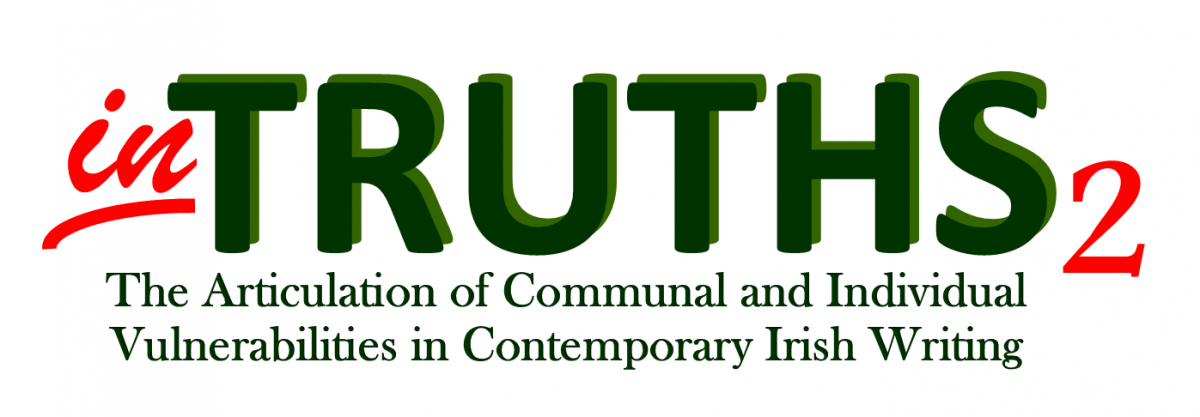inTRUTHS2 "Articulations of Individual and Communal Vulnerabilities in Contemporary Irish Writing"
PID2020-114776GB-I00 MCIN/AEI
Period: 2021-2025

Check our CFP: Special Issue of Irish Studies Review (May 2026) "Vulnerability, Care and Relational Ethics in Contemporary Irish Culture"
IN-TRUTHS 2 RESEARCH TEAM
- M. Teresa Caneda Cabrera (PI) University of Vigo https://orcid.org/0000-0001-5194-1060
- Marisol Morales Ladrón, University of Alcalá de Henares https://orcid.org/0000-0002-2100-7346
- Asier Altuna-García de Salazar, University of Deusto https://orcid.org/0000-0002-0916-9078
- José Carregal Romero, University of Huelva https://orcid.org/0000-0002-1402-9387
COLLABORATORS - WORK TEAM
- Muriel Domínguez Viso, University of Vigo https://netec.webs.uvigo.es/en/members/muriel-dominguez-viso
- Elke D'hoker, KU Leuven https://www.kuleuven.be/wieiswie/en/person/00014427
- Seán Crosson, NUI, Galway https://orcid.org/0000-0002-3026-0968
- Eibhear Walshe, University College Cork https://research.ucc.ie/profiles/A014/ewalshe
CONTEXT
Our previous project inTRUTHS: Cultural Practices of Silence in Contemporary Irish Fiction focused on notions of silence and developed an examination of "unspoken" aspects of Irish private and public life in contemporary Irish writing. We concluded that, in their dissection of the impact of silence on both national and personal levels of experience, the narratives we investigated ultimately foreground the existence of individual and communal forms of vulnerability and also manifest a crucial desire to "speak out" with a view to heal the wounds inflicted on individual citizens and society at large.
Click here for videos of the 19th International AEDEI Virtual Conference: "Silences and Inconvenient Truths in Irish Culture and Society" (University of Vigo, 27-28 May 2021).
Click here for OPEN ACCESS collection Narratives of the Unspoken in Contemporary Irish Fiction: Silences that Speak (Palgrave Macmillan, 2023).
Click on individual orcid numbers for other publications.
FOCUS
Our point of departure for the inTRUTHS2: Articulations of Individual and Communal Vulnerabilities in Contemporary Irish Writing is based on the insights on vulnerability in relation to private and public spaces and experiences in contemporary Ireland gained from our previous research project with which this new project shares methodologies, theories and thematic concerns. inTRUTHS2 moves beyond polarized meanings of vulnerability in an attempt to approach its multifaceted manifestations in the rich cultural scene of contemporary (and specifically pandemic and post-pandemic) Irish writing which, as has been noted, “has demonstrated its capacity to intervene history” (Falci and Reynolds 2020), with internationally acclaimed writers “grappling with the radical contemporary changes of their society” (Reynolds 2020).
AIMS
inTRUTHS2 seeks to register, identify and explore literary articulations of states of vulnerability in Contemporary Ireland, where, as we have already discussed in the publications derived from our previous project inTRUTHS, writers have continued to scrutinize the contradictions and conflicts of their society through narratives that often deal with wounded subjects in the larger context of social precarity and damaging institutional practices. Doubtless, the coming years will witness an upsurge of new writing concerned with the vulnerabilities of a pandemic and (hopefully) a post-pandemic world.
inTRUTHS2 draws on influential studies in the field such as Butler (2004, 2009, 2016), Craps (2013), Ganteau (2015) and the work of Irish Studies scholars like Cahill, Ferriter, Mulhall, Pine, Reynolds and others in order to interrogate how, in the face of individual and communal vulnerabilities affected by global and local forms of precarity, Irish contemporary writers have responded not merely by reflecting on these conditions but have critically engaged with them, often reactivating communal ties of care and cooperation.
HYPOTHESIS
Whereas discussions of the theme of vulnerability in critical theory vary between definitions of vulnerability as eminently a human relational trait, “fundamentally dependent on existing norms of recognition if it is attributed to any human subject” (Butler 2004) and identifications of vulnerability as enabling the articulation of “political agency” (Ferrarese 2018, Butler 2016) most critics agree that vulnerability has become “a paradigm of the contemporary condition and of contemporary culture” (Ganteau 2015) Butler (2016), who has convincingly argued about “the coupling of vulnerability and passivity”, contends that resistance emerges nevertheless, not only despite vulnerability, but precisely because of it: “vulnerability, understood as a deliberate exposure to power, is part of the very meaning of political resistance as an embodied enactment”. Thus, inTRUTHS2 will pay special attention to contemporary writing published since the Irish economic crash, which focus on the effects of economic developments on the lives, finances, and psyches of Irish citizens, while also exploring the broader context of a culture where men and women are turned into vulnerable individuals linked by their common state of uncertainty and precariousness.
CORPUS
Through a polyphony of authors whose texts will provide us with materials for equally polyphonic reflections and conceptual explorations, our research will be particularly concerned with the most recent writing since it is here that the conceptualization of vulnerability becomes terrain for political contestation with the emergence of forms of resistance and the prefiguration of an alternative politics of solidarity. Our hypothesis will be tested by means of a contextualized analysis of specific novels by representative writers such as John Banville, Kevin Barry, Sara Baume, John Boyne, Anna Burns, Lucy Caldwell, Jan Carson, Evelyn Conlon, Emma Donoghue, Anne Enright, Nuala O’Faolain, Claire Keegan, Maeve Kelly, Paul Lynch, Emer Martin, Eimear McBride, John McGahern, Deirdre Madden, Patrick McCabe, Edna O’Brien, Emilie Pine, Keith Ridgeway, Sally Rooney, Donal Ryan and Colm Tóibín, among others.
IMPACT
The international impact of the inTRUTHS2 project is guaranteed by the international trajectory of the Research and Work teams in the past few years and with a majority of reputed scholars in the field with international projection. At the same time, the team is all too conscious of its place and moment, its social implications and potential: Irish Studies has become a distinct and buoyant discipline in Europe, and particularly so in Spain. Therefore, as the Project directs its attention towards the internationalization of results, it also aims to establish links with other Research Projects and Groups in the field of Irish Studies on a national scale with a view to share synergies, strengthen links and favour cooperation in future research funding opportunities within the European and international frameworks.
